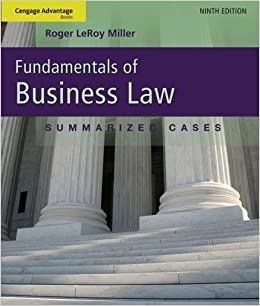
Cengage Advantage Books: Fundamentals of Business Law 9th Edition by Roger LeRoy Miller
Edition 9ISBN: 978-1111530624
Cengage Advantage Books: Fundamentals of Business Law 9th Edition by Roger LeRoy Miller
Edition 9ISBN: 978-1111530624 Exercise 10
Hicklin v. Onyx Acceptance Corp.
Delaware Supreme Court, 970 A.2d 244 (2009).
court5.delaware.gov
FACTS Shannon Hicklin bought a 1993 Ford Explorer under an installment sales contract. When she fell three payments behind-still owing $5,741.65-Onyx Acceptance Corporation repossessed the car. The car was sold for $1,500 at a private auction held by ABC Washington-Dulles, LLC. After deducting the costs of repossession and sale, there was a deficiency under the contract of $5,018.88. Onyx filed a suit in a Delaware state court to collect this amount from Hicklin. To establish that the sale was commercially reasonable, Onyx offered proof only of the price. The court found that the fair market value of the car at the time of the sale was $2,335 and held that the sale was commercially reasonable solely because the auction price was more than 50 percent of this estimated market value at the time of the auction. The court granted Onyx a deficiency judgment, which a state intermediate appellate court affirmed. Hicklin appealed.
ISSUE Does the price obtained on a sale of collateral prove, without more, that the sale was commercially reasonable?
DECISION No. The Delaware Supreme Court reversed the lower court's judgment and remanded the case.
REASON The appellate court explained that under UCC 9-610(a), Onyx could prove that its sale was commercially reasonable in one of two ways. It could show that every aspect of the sale was conducted in a commercially reasonable manner or, under UCC 9-627(b)(3), that the sale conformed with the reasonable commercial practices among dealers in the type of property that was the subject of the disposition. Onyx did not meet either of these standards. Because every aspect of a sale must be commercially reasonable, Onyx's showing only that the private auction sale grossed more than 50 percent of the value of the collateral was not enough. Onyx did not provide any proof of the details of the auction-its procedure, publicity, attendance, or convenience of location. Nor did Onyx offer any proof that the sale conformed to the accepted practices in its trade.
FOR CRITICAL ANALYSIS-Ethical Consideration Why does UCC 9-627(b)(3) require that a sale be conducted in conformity with the reasonable commercial practices among dealers in the type of property that was the subject of the disposition?
Delaware Supreme Court, 970 A.2d 244 (2009).
court5.delaware.gov
FACTS Shannon Hicklin bought a 1993 Ford Explorer under an installment sales contract. When she fell three payments behind-still owing $5,741.65-Onyx Acceptance Corporation repossessed the car. The car was sold for $1,500 at a private auction held by ABC Washington-Dulles, LLC. After deducting the costs of repossession and sale, there was a deficiency under the contract of $5,018.88. Onyx filed a suit in a Delaware state court to collect this amount from Hicklin. To establish that the sale was commercially reasonable, Onyx offered proof only of the price. The court found that the fair market value of the car at the time of the sale was $2,335 and held that the sale was commercially reasonable solely because the auction price was more than 50 percent of this estimated market value at the time of the auction. The court granted Onyx a deficiency judgment, which a state intermediate appellate court affirmed. Hicklin appealed.
ISSUE Does the price obtained on a sale of collateral prove, without more, that the sale was commercially reasonable?
DECISION No. The Delaware Supreme Court reversed the lower court's judgment and remanded the case.
REASON The appellate court explained that under UCC 9-610(a), Onyx could prove that its sale was commercially reasonable in one of two ways. It could show that every aspect of the sale was conducted in a commercially reasonable manner or, under UCC 9-627(b)(3), that the sale conformed with the reasonable commercial practices among dealers in the type of property that was the subject of the disposition. Onyx did not meet either of these standards. Because every aspect of a sale must be commercially reasonable, Onyx's showing only that the private auction sale grossed more than 50 percent of the value of the collateral was not enough. Onyx did not provide any proof of the details of the auction-its procedure, publicity, attendance, or convenience of location. Nor did Onyx offer any proof that the sale conformed to the accepted practices in its trade.
FOR CRITICAL ANALYSIS-Ethical Consideration Why does UCC 9-627(b)(3) require that a sale be conducted in conformity with the reasonable commercial practices among dealers in the type of property that was the subject of the disposition?
Explanation
Disposition of the asset:
When a secure...
Cengage Advantage Books: Fundamentals of Business Law 9th Edition by Roger LeRoy Miller
Why don’t you like this exercise?
Other Minimum 8 character and maximum 255 character
Character 255


